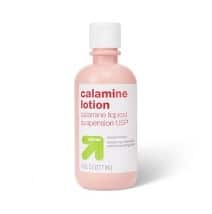How Great Ads Provoke Fanatical Loyalty
Poison ivy and chiggers: the twin scourges of my childhood.
I grew up in northeast Oklahoma, World Headquarters of a blood-thirsty little beast known as the “chigger.” Chiggers live in the Bermuda grass common in NE Oklahoma. Their favorite meal is the bare flesh of sweaty little boys.
And Poison Ivy? She wasn’t just a Batman Supervillain. Poison Ivy lurked in every wooded glade and beckoning dale. She hid in the dark, shadowy places my buddies and I loved to roam. Any encounter with her toxic touch left our skin with more bumps than a cobblestone alley and more welts than a 60-year-old woolen army blanket.
Encounters with one or the other triggered hours of discomfort. Encounters with both doomed me to days of itchy misery. In fact, these twin scourges gave me my first introduction to The Itch Which Must Be Scratched.
What’s It All Mean?
Now, even if you’ve never suffered through summertime chigger bites and poison ivy rashes, I know for sure you’ve experienced The Itch Which Must Be Scratched.
How do I know?
Because every human being has that same itch. It affects our souls, not our bodies. And it is the default condition of people in our markets today.

Viktor Frankl
That itch is the absence of Meaning.
Our age has rejected the time-tested beliefs that once gave Meaning to our predecessor’s lives. However, we humans cannot tolerate this lack of meaning in our lives. (Great thinkers from C.S Lewis[1] to Eric Hoffer[2] to Viktor Frankl explored why in detail.)
In the absence of anything transcendent to give us the meaning we crave, we will latch onto anything that has the right “shape.”
Great ads have the right shape.
Sucky ads don’t. Madison Avenue and its progeny crank out sucky ads like Disney cranks out sappy cartoons.
Great ads make you feel something deep in the core of your being, in that sacred place where Meaning makes her home. Sucky ads don’t.
What do great ads all have in common? Why are they able to scratch The Itch Which Must Be Scratched? Because great ads have the right “shape” to fill that gaping hole in the human heart – the void that exists in the absence of Meaning.
Great Ads Answer Big Questions
Jack, you’ve lost me. What the heck are you talking about? How does this help me make more money in my business?
That’s a fair complaint. Let me unpack the idea for you.
 Every human being comes into the world with a ravenous hunger for answers to the 4 Big Questions:
Every human being comes into the world with a ravenous hunger for answers to the 4 Big Questions:
- Where did I come from? (Origin)
- Why am I here? (Purpose)
- Where am I going? (Adventure)
- Who am I? (Identity)
When we possess answers to all 4 Big Questions, our lives bubble over with meaning. We can face any challenge and overcome any obstacle.[3] When we have no answers whatsoever, then the smallest inconveniences become intolerable.
As I said before, this is the default condition of most people today. Great ads help relieve that existential burden – if only for a moment – because great ads supply answers to at least one of those 4 Big Questions.
Still not convinced? Here are six examples:
- Apple “1984” lets people see themselves as heroes of the resistance. We’re on the right side of history. We’re the good guys. This ad answers the Identity
- Apple “Think Different” answers all 4 Big Questions. It puts the audience on the side of people who made a positive difference in the world, (Identity). It puts Apple, and therefore the people who identify with Apple, in the same lineage as these great innovators, (Origin). And it gives Mac users a Purpose and an Adventure: I am here to think different. I am going to help change the world.
- Apple “I’m a Mac / I’m a PC” answers the Identity question in a negative way. PC is everything old, dorky, awkward, and backward. Mac is cool, hip, cutting edge, progressive. What’s even more brilliant is that Apple literally answers the Identity question in this ad: I’m a Mac.
- Old Spice “I’m on a Horse” answers the Identity question, plus it implies an answer to the Adventure The man in the ad is an ideal man. Of particular note is that the identity of the watcher changes based on his or her gender. If the watcher is a woman, then her identity becomes I am the type of woman who attracts the ideal man. If a man, then his identity becomes I am the type of man my woman really wants. That’s a potent mixture to pack into a 30-second commercial.
- Subaru “I’m sorry” answers the Identity and Purpose questions this way: I am the type of person who protects the people I love. I did a brief analysis of the full ad here. (Note: the 60-second version of this ad is no longer available anywhere online.)
- Roy Williams “The World’s Most Angry Mountain” answers the questions of Identity, Purpose, and Adventure: I am the type of person who achieves great things. I am here to achieve great things. I am going to be handsomely rewarded for it.
 Ads that scratch The Itch Which Must Be Scratched provide existential relief to people in your market. Their automatic response will be fanatical loyalty to your brand.
Ads that scratch The Itch Which Must Be Scratched provide existential relief to people in your market. Their automatic response will be fanatical loyalty to your brand.
It’s the same response I have decades later to Calamine Lotion. (If you know, you know.)
If you think you’re ready to rock your market with ads that move the needle, we should talk. When you want to transform your slightly-better-than-average brand into a lovable, meaningful powerhouse brand, we should definitely talk.
[1] In his book The Abolition of Man, C.S. Lewis explores the essential place of Meaning in the life of every human being. For those who prefer fiction to non-fiction, his novel That Hideous Strength explores the same theme. (Unrelated to our interests in this article, he also explains how this state of affairs came to be.)
[2] Hoffer’s landmark book, The True Believer, is essential for understanding the state of our culture today. It delivers a penetrating study into how a person becomes a passionate True Believer.
[3] Viktor Frankl survived a Nazi death camp to pen his extraordinary book Man’s Search for Meaning. He observed that prisoners who survived the death camps were those who had something to live for, something that gave Meaning to their suffering. Those who lacked Meaning simply lost the will to live.
- Shared Suffering: The Missing Ingredient in Customer Loyalty - June 25, 2025
- The Unignorable Jingle: Win Hearts & Customers in 8 Seconds - June 17, 2025
- The Metric Trap Sabotaging Your Marketing - April 17, 2025

